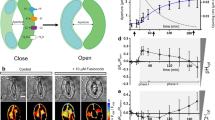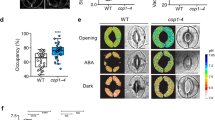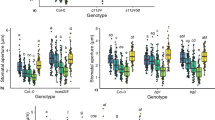Abstract
THE opening of stomatal pores in the epidermis of plant leaves is caused by an increase in turgor pressure of the guard cells as a result of the accumulation of potassium salts1,2. Although growth hormones have been shown to affect stomatal opening3, the transduction pathways by which growth regulators exert their effects on stomatal action are largely unknown. Here we report that auxins can elicit stomatal opening. These phytohormones modulate anion channels4,5 in the plasma membrane in what may be an initial step in regulated volume increase in guard cells. Our patch-clamp experiments demonstrate that auxins can directly interact with the extracellular face of the channel. As a result, its activation potential is shifted towards the resting potential of the cell to favour transient channel opening.
This is a preview of subscription content, access via your institution
Access options
Subscribe to this journal
Receive 51 print issues and online access
$199.00 per year
only $3.90 per issue
Buy this article
- Purchase on Springer Link
- Instant access to full article PDF
Prices may be subject to local taxes which are calculated during checkout
Similar content being viewed by others
References
Raschke, K. Encyclopedia of Plant Physiology Vol. 7 383–441 (Springer, Berlin, 1979).
MacRobbie, E. A. C. Bot. Acta 101, 140–148 (1988).
Snaith, P. J. & Mansfield, T. A. J. exp. Botany 33, 360–365 (1982).
Keller, B. U., Hedrich, R. & Raschke, K. Nature 341, 450–452 (1989).
Hedrich, R., Busch, H. & Raschke, K. EMBO J. 9, 3889–3892 (1990).
Bates, G. W. & Goldsmith, M. H. Planta 159, 231–237 (1983).
Felle, H., Peters, W. & Palme, K. Biochim. biophys. Acta (in the press).
Hamill, O. P., Marty, A., Neher, E., Sakmann, B. & Sigworth, F. J. Pflügers Arch. ges. Physiol. 391, 85–100 (1981).
Schroeder, J. I., Hedrich, R. & Fernandez, J. M. Nature 312, 361–362 (1984).
Rubery, P. H. & Sheldrake, A. R. Planta 118, 101–121 (1974).
Hille, B. Ionic Channels (Sinauer, Sunderland, Massachusetts, 1983).
Schroeder, J. I., Raschke, K. & Neher, E. Proc. natn. Acad. Sci. U.S.A. 84, 4108–4112 (1987).
Blatt, M. R. J. Membr. Biol. (in the press).
Busch, H., Hedrich, R. & Raschke, K. Plant Physiol. 93, 17 (1990).
Hedrich, R. & Schroeder, J. I. A. Rev. Plant Physiol. 40, 539–569 (1989).
Schroeder, J. I. & Hedrich, R. Trends Biochem. Sci. 5, 187–192 (1989).
Palme, K. Int. Rev. Cytol. 132, 223–283 (1992).
Author information
Authors and Affiliations
Rights and permissions
About this article
Cite this article
Marten, I., Lohse, G. & Hedrich, R. Plant growth hormones control voltage-dependent activity of anion channels in plasma membrane of guard cells. Nature 353, 758–762 (1991). https://doi.org/10.1038/353758a0
Received:
Accepted:
Issue Date:
DOI: https://doi.org/10.1038/353758a0
This article is cited by
-
Plant physiological and molecular responses triggered by humic based biostimulants - A way forward to sustainable agriculture
Plant and Soil (2023)
-
Application of exogenous indole-3-acetic acid on shoots of Zamioculcas zamiifolia for enhancing toluene and formaldehyde removal
Air Quality, Atmosphere & Health (2020)
-
Effect of indole-3-acetic acid on aluminum-induced efflux of malic acid from wheat (Triticum aestivum L.)
Plant and Soil (2011)
-
Auxin in action: signalling, transport and the control of plant growth and development
Nature Reviews Molecular Cell Biology (2006)
-
Calcium signaling system in plants
Russian Journal of Plant Physiology (2005)
Comments
By submitting a comment you agree to abide by our Terms and Community Guidelines. If you find something abusive or that does not comply with our terms or guidelines please flag it as inappropriate.



